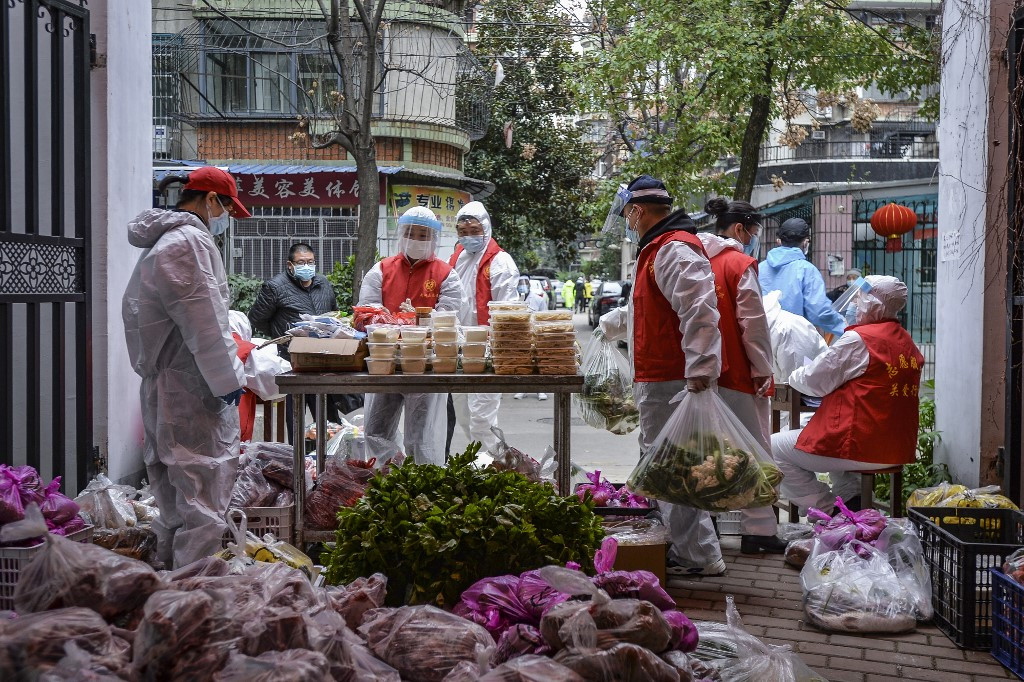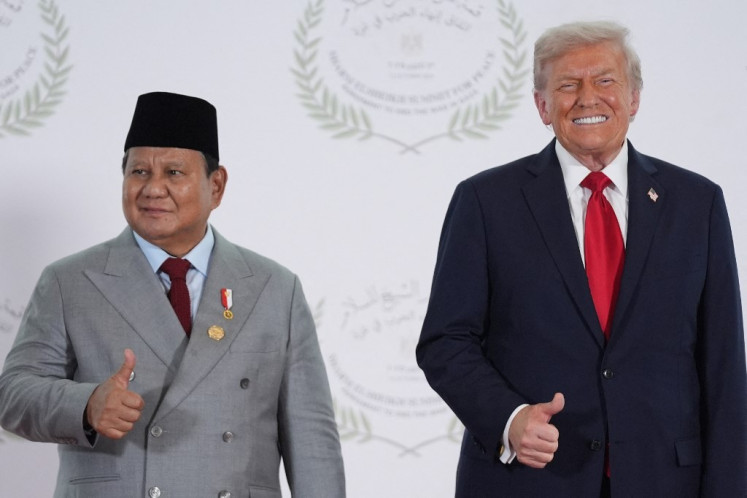Popular Reads
Top Results
Can't find what you're looking for?
View all search resultsPopular Reads
Top Results
Can't find what you're looking for?
View all search resultsCOVID-19 stimulus: Learning from others
Besides a disruption of supply chains to and from China, lockdowns and partial lockdowns in many countries and uncertainties surrounding oil prices are exacerbating the situation.
Change text size
Gift Premium Articles
to Anyone
S
ince the World Health Organization declared COVID-19 a pandemic on March 11, concerns over the global economy has increased. Such pessimism was reflected by the United Nations Conference on Trade and Development (UNCTAD), which estimated the world’s losses as a result of novel coronavirus at around US$1 trillion and economic growth under 2 percent, far under the World Bank’s earlier prediction of 2.5 percent in January. Besides a disruption of supply chains to and from China, lockdowns and partial lockdowns in many countries and uncertainties surrounding oil prices are exacerbating the situation.
Signs of an impending recession started with a declining trust in business prospects. Bloomberg reported on March 16 that the Dow Jones index had decreased by 19 percent, the Nikkei by 27 percent and the Financial Times Stock Exchange by 33 percent. Hardest hit businesses include airlines, with the International Air Transport Association estimating losses to reach $113 billion as a result of declining domestic and international travel.
Read also: Rupiah at 1998 crisis level pressures reserves, foreign-denominated debt
In Indonesia, investors’ trust has declined in the past two weeks, as reflected at the Indonesia Stock Exchange (IDX). The Indonesian Composite Index plunged by 31.09 percent from January, reaching 4,330.67 by Thursday, while the rupiah depreciated by 15.12 percent to the US dollar. Gold increased in value by 22.41 percent from early January.
To minimize the economy’s contraction, UNCTAD director Richard Kozul-Wright has said that the only choice was government stimuli for hard-hit economies in the pandemic, as adopted by a number of countries.
United States President Donald Trump signed into a law the coronavirus relief package on Wednesday. The three-phase economic stimulus comprises first, an allocation of $48.3 billion for research to find a vaccine, help state and city governments fight the spread of the virus and to contain the virus from spreading outside the US.
Second, free testing for COVID-19 to those in need, paid emergency leave, expanded insurance for the unemployed, food security and increased funds for Medicaid. The tax filing period for individuals and businesses has been extended by 90 days to April 15, thus freeing $300 billion for three months for redistribution.
Third, a stimulus of $1 trillion. This includes $500 million to be distributed to each taxpayer with an average amount of $1,000, depending on income and household size from the first stage of April 6 and the second stage of May 18.
Read also: Govt to disburse Rp 38t to help the country's underprivileged amid COVID-19 outbreak
This package also provides support to affected businesses, including $50 billion for the airline and cargo industry, $150 billion for the “severely distressed sectors” in loans for tourism-related businesses. Also included is $300 billion, provided as loan guarantees for small and medium enterprises (SMEs) with 500 employees or less to enable business continuity.
In Australia, Prime Minister Scott Morrison announced an economic stimulus of A$17.6 billion ($10.19 billion), mainly for job security, business continuity and for SMEs owners.
The stimulus comprises support for business investments (A$3.9 billion), loans for SMEs (A$6.7 billion) and to keep their employees working (A$1.3 billion), cities and communities (A$1 billion) and A$4.8 billion for households including pensioners, veterans and those on social security.
South Korea announced its economic stimulus on March 4, amounting to 11.7 trillion won ($9.8 billion). Finance Minister Hong Nam-ki is also focusing on vulnerable sectors such as SMEs and others in the informal sector. The government is spending 3.2 trillion won to close the income deficit, 2.3 trillion won for health services and quarantine needs, 3 trillion won for SMEs facing difficulties paying employees and child care subsidies of 3 trillion won. The remainder will be used as a fiscal injection.
What about China? The People’s Bank of China announced on Feb. 3 the extension of loans reaching $174 billion to stabilize the currency market and to provide cash-on-hand for banks. The next day, an additional $71 billion was added. Apart from reducing the lending facility rate on Feb. 16, the requirement of bank reserves allowed to be loaned to the real sector was decreased by $79 billion on March 13.
Similar stimuli are seen among other countries in Japan, the United Kingdom, Italy, France, Germany and Canada. On March 4, the International Monetary Fund provided $50 billion, including $10 billion in loans with 0 percent interest, to member countries. The IMF even pledged to mobilize loans reaching $1 trillion if needed, where members could request loans of up to $1 billion (from the current maximal capacity of $400 million).
On March 3, the World Bank issued an early loan package of $12 billion to pandemic-affected nations, of which $8 billion were fresh loans.
As of Thursday, countries have applied five types of stimuli. First, stimuli to support health services and operational funds to make lockdowns or partial lockdowns effective.
Two, direct cash aid for citizens to enable consumption and support the domestic real sector. Third, stimuli for SMEs, the hardest hit economic sector, comprising loan guarantees and avoiding layoffs. Four, providing stimuli to the most severely affected sectors on the verge of bankruptcy and that would add to unemployment.
Five, lowering interest rates and bank reserve requirements, and tax stimuli for individuals and corporations.
Read also: Indonesian businesses look to Singapore, Malaysia for COVID-19 measures
For Indonesia, additional practical and fast-yielding measures are urgent in potential sectors. First, supporting fisheries and providing investment in cold storage and canning. Second, relaxing export and investment permits in mining at least during the pandemic. Third, labor intensive industries must be prioritized to enable more labor absorption, such as with tax holidays for a certain period, for firms with at least around 2,000 workers.
Fourth, investment in tourism would need aggressive measures, such as corporate tax holidays for several years.
Fifth, other equally important, pragmatic measures are more affordable loans for micro, small and medium enterprises as they contribute 60 percent of economic growth. Ideally, the interest rate should be around 2 percent for this sector.
Sixth, stimuli for property. Property sales have contracted by 16.33 percent. Restrictions on land and property ownership and related taxes should be relaxed to enable entry of capital into the country.
Lastly, investments in sectors such as agriculture and fish farming to increase food security need to be given low-interest credit, such as with annual rates of 2 percent.
Amid the rupiah’s depreciation and a plunging IHSG, it is high time for more serious stimulus packages to increase public and business trust — mainly to support the spending power of households and the continuity of small businesses.
Most experts say the pandemic could last from four months to two years, for which the government is preparing its scenario, supported by all our prayers so that this pandemic can swiftly vanish from this beloved Earth.
______
Dato’ Sri Tahir is the founder of Mayapada Group and a member of the Presidential Advisory Council. Badri Munir Sukoco is a professor at the School of Economics and Business, Airlangga University.










